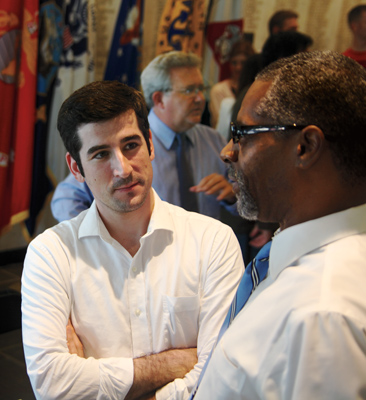Change the Conversation
How do you convince people that homelessness can actually end, permanently?By Mary Jo Curtis
[Homelessness] When Jake Maguire ’07 went to work for a political consulting firm after graduation, he knew his job was all about getting clients into the news. That’s how public relations experts shape voters’ opinions of candidates and, importantly, help campaigns raise money.
But when the careers of two of the firm’s biggest clients ended in scandal, a disillusioned Maguire decided to move on. He began a Ph.D. program, until a call from Rosanne Haggerty ’82 interrupted his studies. That call brought him back to public relations—but with a very different kind of client.

During his internship “we screened out the really tough homeless,” Maguire says; “they never showed up to even ask about housing.” This new project would take a different approach. It was now the “really tough homeless”—those most at risk of dying in the streets—who would take first priority.
Right: Maguire talking with the 100,000th person housed through the campaign. “We’ve helped 186 communities house 105,580 people,” he says.
“First-come, first-served makes the least sense,” Maguire says. “It’s not that there’s a dearth of resources, but there’s a learned dysfunction in the way institutions deal with problems.” Wondering if they’d been tackling the problem backward, 100,000 Homes adopted the “Housing First” model created by Sam Tsemberis. As Maguire explains, instead of trying to treat people’s medical and addiction issues before finding them housing, “what if housing is the solid foundation we need first?”
Armed with this philosophy, the 100,000 Homes team reached out to U.S. cities with large homeless populations, among them Los Angeles, Denver, New York and Nashville. Working with city leaders, they explored better ways of using existing resources by bringing together key players—social service agencies, police, local businesses—and identifying the people whose medical, psychiatric or addiction problems make them most likely to die on the streets. The campaign wanted to get the most vulnerable into permanent, supportive housing as quickly as possible.
But first, says Haggerty, 100,000 Homes had to convince partner communities that homelessness is not in fact an intractable problem. That’s where Maguire came in.
“Jake is our secret weapon,” Haggerty says. “He grasped that this is more of a movement than PR; it’s education, and changing and shaping attitudes. Jake changed the conversation from being about a broken system and status quo to show, through community work, that it’s a solvable problem.”
Maguire now had new clients to promote—the 100,000 Homes campaign and its mission, as well as the partner communities with whom they were housing thousands. He won them media attention through The New York Times, 60 Minutes and NPR.
This past June, the campaign reached its goal ahead of time. “We’ve helped 186 communities house 105,580 people,” says Maguire, now communications director for Community Solutions, the Haggerty organization that administered the 100,000 Homes campaign. Community Solutions has a new program, Zero: 2016, whose goal is to end chronic homelessness among the medically at-risk by the end of 2016, and among veterans by the end of 2015.
“People need to develop a more effective response to create a new story; Jake has shaped that new story,” says Haggerty. “It’s all about success, hopefulness and learning.”
Mary Jo Curtis is a Holyoke-based freelance writer.
Linda Kaufman photo